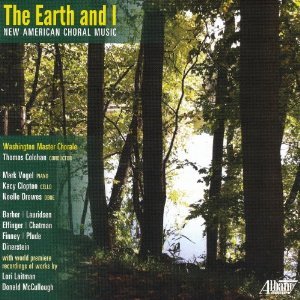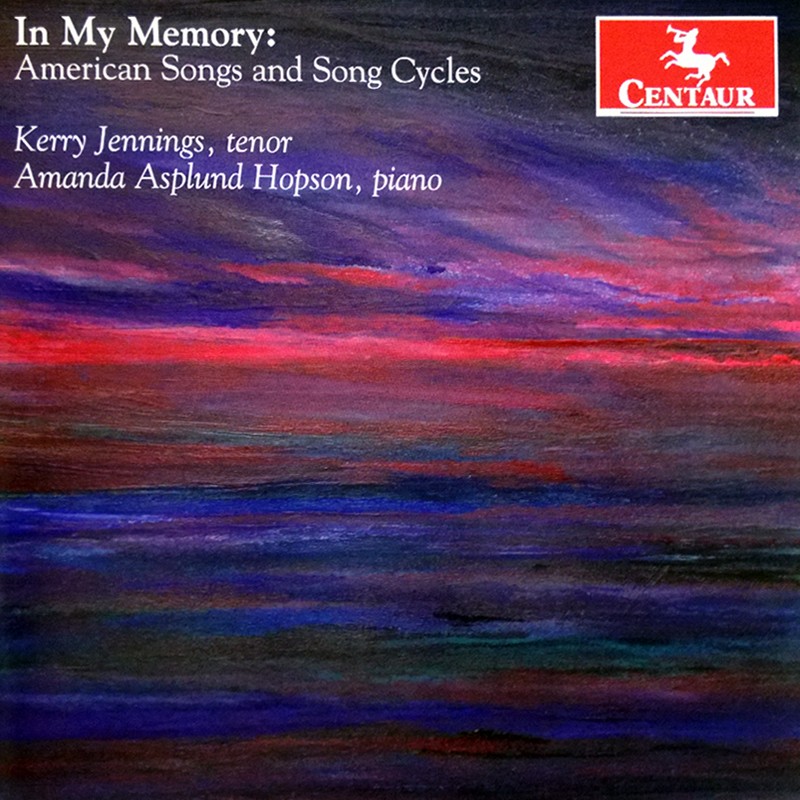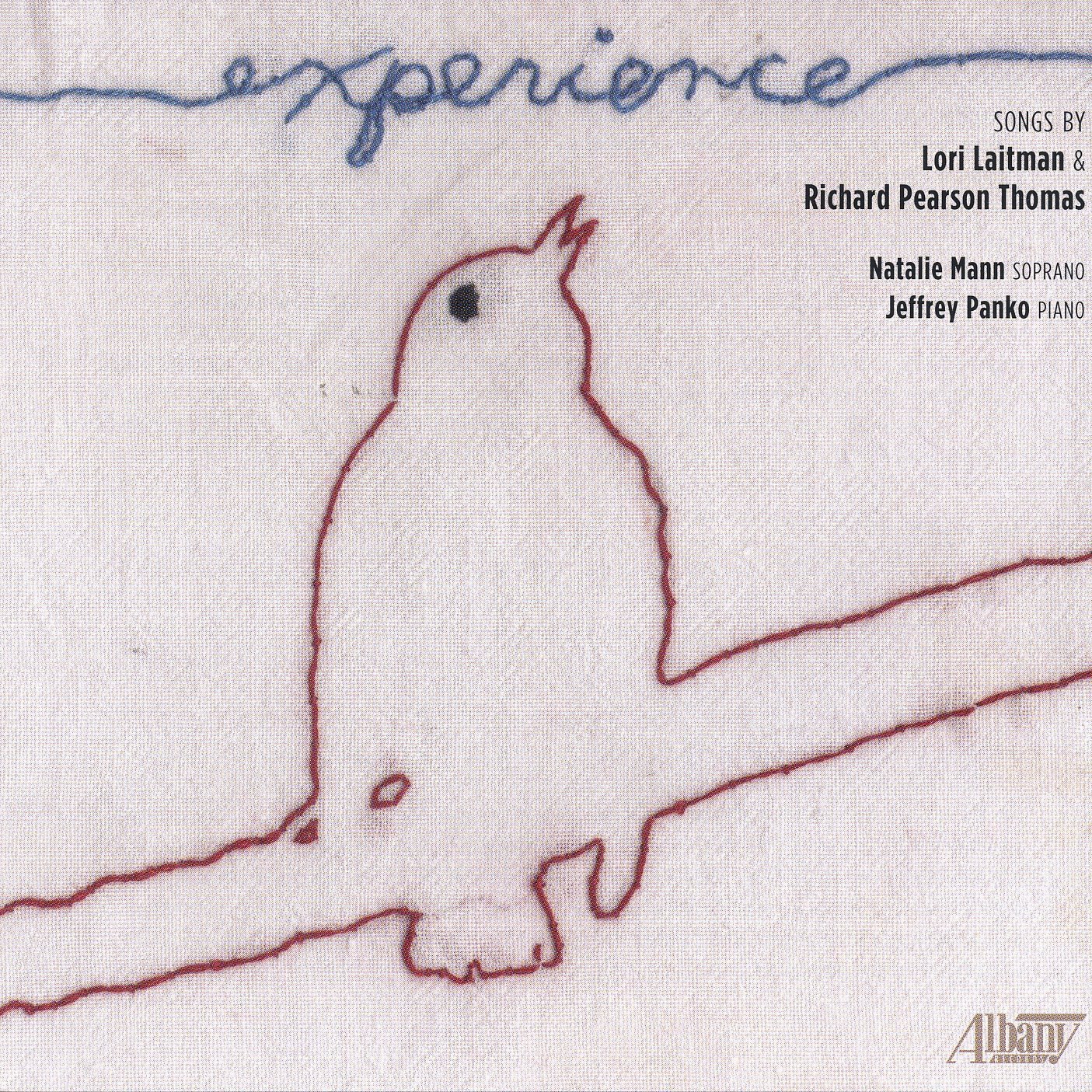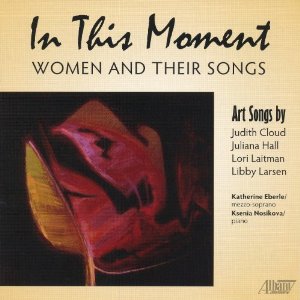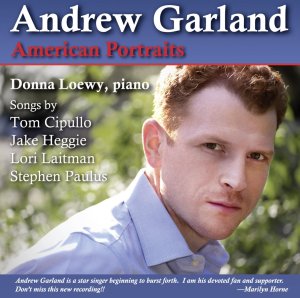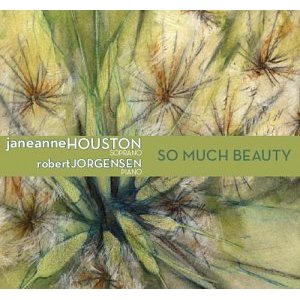Lori's Solo Recordings
On the Acis Label
The Ocean of Eternity
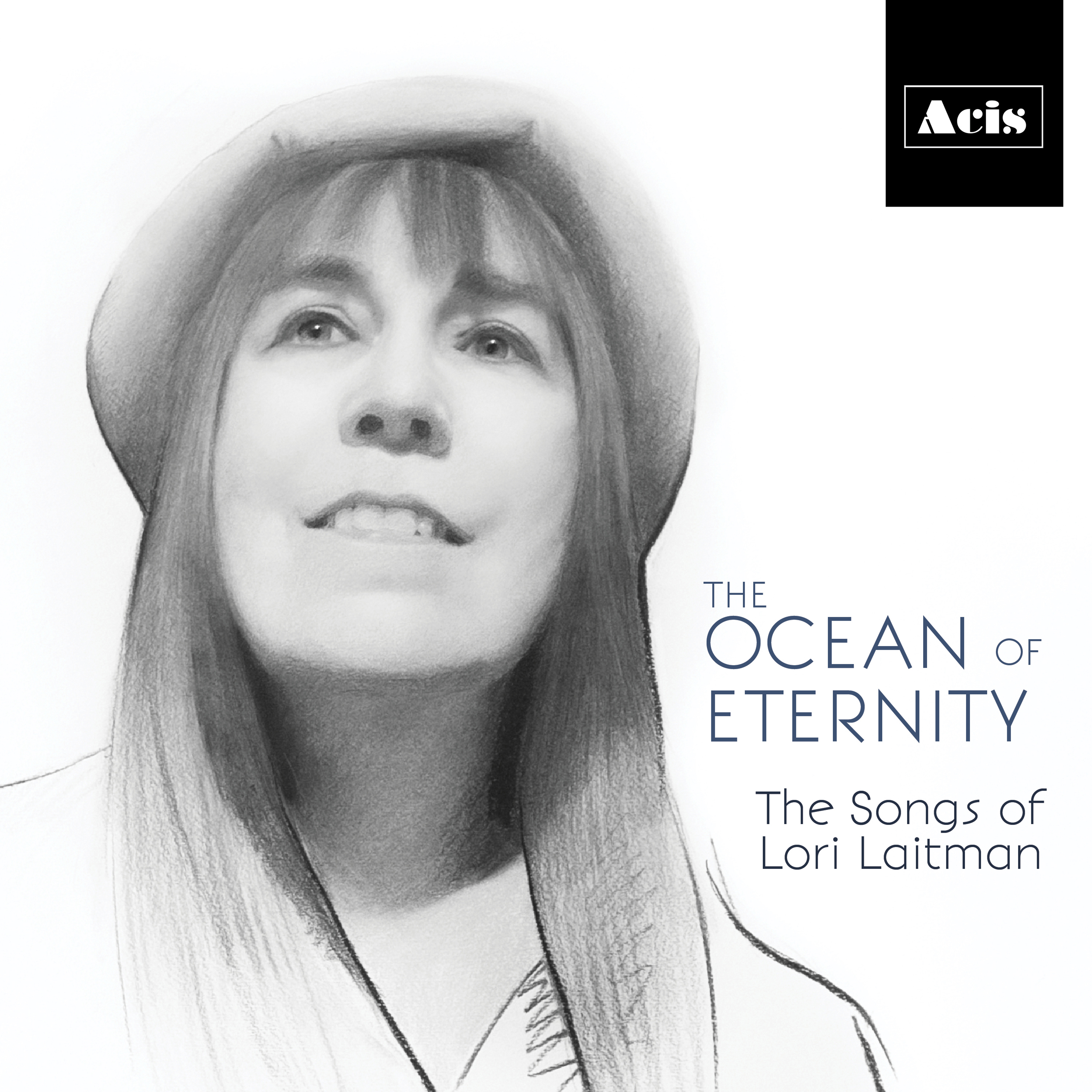
Lori's latest CD, The Ocean of Eternity, was released on Acis on March 29, 2022. The album features renowned artists in several world premiere recordings. The centerpiece is The Ocean of Eternity, scored for the unusual combination of soprano, soprano saxophone and piano. This cycle about mortality sets a poem by Anne Ranasinghe, a German Jew who escaped the Holocaust and eventually settled in Sri Lanka. New arrangements of Vedem Songs tell the story of the boys imprisoned in the Terezin Concentration Camp, while excerpts from Ludlow, Laitman’s opera with librettist David Mason, showcase America’s tragic treatment of immigrants. Throughout the album, with her signature gift for melody, Laitman illuminates the classic poetry of Emily Dickinson, Edna St. Vincent Millay, and William Butler Yeats; Holocaust poetry by Petr Ginz, Hanuš Hachenburg and Zdeněk Ornest; and contemporary works by Annie Finch, Dana Gioia, Jennifer Reeser, A. E. Stallings, and Diane Thiel.
Artists featured are sopranos Nicole Cabell, Alisa Jordheim, Maureen McKay, Patrice Michaels and Yungee Rhie; mezzo-soprano Katie Hannigan; baritone Daniel Belcher; violinist Tarn Travers; saxophonist Michael Couper; and pianists Lori Laitman, ChoEun Lee, Tze-Wen (Julia) Lin and Andrew Rosenblum.
“Despite utilizing conventional compositional techniques, her unique voice always shines through; her music has an unmistakable sense of identity, regardless of the stylistic elements employed. She writes with masterful skill in many styles and emotional atmospheres. [T]his is a fine look at the music of Lori Laitman. It should appeal to all who love art song, and the performers are uniformly first rate.”
Opera News, October 2022
Lori Laitman’s works are often emotional in expression with elements of political or social comment. The excerpted songs from her oratorio Vedem (2010, set in Terezín), and the opera Ludlow (2012, inspired by a massacre of immigrants in the Colorado town in 1914), are eloquent testimony of that side of her creative persona. There is humour aplenty, too, as in the concluding set Dear Edna…Delicacy and ingenuity combine in the triptych Fresh Patterns…Most delightful of all is The Apple Orchard (2004), a melodic gem.
Gramophone Magazine, July 2022
“To produce a mighty book, you must choose a mighty theme”, wrote Herman Melville in reference to Moby-Dick. That line came to mind as I thought of how the overwhelmingly mighty theme of the Holocaust has led Lori Laitman to produce a mighty body of compositions that make its tragic horror palpable…Laitman has a knack for selecting good texts and setting them to music in ways that mirror so well their patterns and cadences… The theme of mortality weaves its way through this gripping and thought-provoking program in a variety of ways with each song amplifying its message.
American Record Guide, July/August 2022
Lori Laitman has composed over 300 art songs; it is so clearly where she is most comfortable and where her heart lies. In this new CD, The Ocean of Eternity, there is an ease of expression here that few achieve, partly the result of her full absorption of her chosen texts, partly the result of a sort of free- flow melody…Laitman’s opera Ludlow is a tale of immigrants whose cause climaxed in a 1914 massacre in Colorado; more than two dozen innocent people were killed. All arias are taken from the first act...Laitman invokes nostalgia so well: bitter-sweet, certainly; saccharine-sweet, never… Fresh Patterns combines Dickinson’s “It’s All I Have To Bring Today” and Annie Finch’s “Letter to Emily Dickinson”… Hearing the two together is fascinating, as well as a virtuoso compositional feat… Laitman herself plays on her setting of W. B. Yeats’s “When You Are Old,” a lovely setting fully honored by McKay’s beautiful realization...It’s fascinating to hear the loving way Laitman delivers her own piano writing… The “Edna” of Laitman’s short song cycle Dear Edna refers to the poet, Edna St. Vincent Millay… Laitman’s way of working with humor is really somewhat delicious, probably because she never sacrifices depth for a titter. A beautiful selection of Laitman songs, this disc is an absolute gift to all lovers of the voice.
Fanfare Magazine, July 2022
Laitman's customary gift for melody is in full force throughout, as is her practice of tailoring music and tone to the character of the text. To that end, the material extends from majestic and lyrical expressions to ones sprinkled with humour and irreverence.
Textura.org, July 2022
The Ocean of Eternity may well be the finest yet of Lori Laitman’s albums of art song – and never do I remember being more beautifully drawn into a listening experience than I was with the opening of the first track of this album (“Memories of Prague,” from Vedem Songs). The album as a whole more than lives up to that promise. Those who know Laitman’s music will find her characteristic mixture of poetic insight, inexhaustible imagination, sonorous beauty, skillful writing for the voices and instruments, and of course humor – this sometimes philosophically tinged. The performances are uniformly stunning and the album’s net effect is perhaps best summed up as: “let us have more soon, please.” It’s an album I’m glad to have as a part of my musical experience, to carry around as part of my musical self.
John Michael Cooper, Journeys blog
For purchasing information, please click here.
Are Women People?
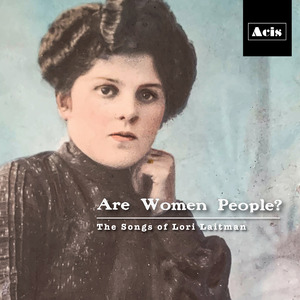 Lori's Are Women People? was released by Acis on May 27, 2021 and is available for purchase and/or streaming on Amazon, Apple, Spotify and Pandora.
Lori's Are Women People? was released by Acis on May 27, 2021 and is available for purchase and/or streaming on Amazon, Apple, Spotify and Pandora.
Artists featured are Nicole Cabell, Maureen McKay, Kyle Knapp, Daniel Belcher, Fourth Coast Ensemble, Tarn Travers, Andrew Rosenblum, Maria Sumareva and Lori Laitman — who perform a varied program ranging from settings of Margaret Atwood and Dana Gioia to Alice Duer Miller, Susan B. Anthony and the U.S. Constitution.
Of the CD, Fanfare Magazine wrote:
"This glorious output of song (with the odd chamber piece) acts as yet another testament to the strength of Laitman's vocal output...This disc is itself a treasure — another example of the inexhaustible font of imagination that is Lori Laitman."
On the Albany Records Label
Within These Spaces
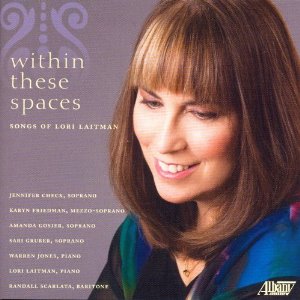 Lori’s fourth album of solo vocal works, Within These Spaces (Amazon, iTunes) was released May 1, 2009. The recording features artists Jennifer Check, Karyn Friedman, Amanda Gosier, Sari Gruber, Warren Jones, Lori Laitman and Randall Scarlata. The CD contains 34 new songs, all composed since 2000 to poetry written between the years of 1612 and 2008.
Lori’s fourth album of solo vocal works, Within These Spaces (Amazon, iTunes) was released May 1, 2009. The recording features artists Jennifer Check, Karyn Friedman, Amanda Gosier, Sari Gruber, Warren Jones, Lori Laitman and Randall Scarlata. The CD contains 34 new songs, all composed since 2000 to poetry written between the years of 1612 and 2008.
“One hundred years hence, when critics look back at the art songs of our era, there will be many fine composers to laud and applaud, but few will deserve higher praise than Lori Laitman. …With nearly 200 songs already to her credit, there seems to be not the slightest diminishment in the expressive impact of her writing or the bracing originality of her ideas. To paraphrase a comment once made about the prolific Camille Saint-Saëns, Laitman seems to create great songs as easily and naturally as a tree produces apples, and one might add that hers are especially delicious and distinctive.” (The Journal of Singing)
“This is music of depth and richness that connects with the soul.” (American Record Guide)
“Her affinity for the voice…is beyond doubt…her songs represent outpourings of great beauty.” (Fanfare Magazine)
Becoming a Redwood
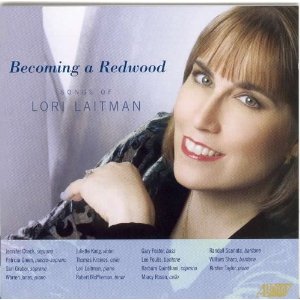 Lori's third album, Becoming a Redwood (Amazon, iTunes), was released October, 2006. The songs on the recording are compositions in partnership with contemporary poets Mary Oliver, Thomas Lux, Dana Gioia, Paul Muldoon, Anne Ranasinghe, Karen Gershon and C.G.R. Shepard. The CD features sopranos Jennifer Check, Sari Gruber and Barbara Quintiliani; mezzo-soprano Patricia Green; tenor Robert McPherson; baritones Lee Poulis, Randall Scarlata and William Sharp; bass Gary Poster; cellists Thomas Kraines and Marcy Rosen; violinist Juliette Kang; and pianists Warren Jones, Lori Laitman and Kirsten Taylor.
Lori's third album, Becoming a Redwood (Amazon, iTunes), was released October, 2006. The songs on the recording are compositions in partnership with contemporary poets Mary Oliver, Thomas Lux, Dana Gioia, Paul Muldoon, Anne Ranasinghe, Karen Gershon and C.G.R. Shepard. The CD features sopranos Jennifer Check, Sari Gruber and Barbara Quintiliani; mezzo-soprano Patricia Green; tenor Robert McPherson; baritones Lee Poulis, Randall Scarlata and William Sharp; bass Gary Poster; cellists Thomas Kraines and Marcy Rosen; violinist Juliette Kang; and pianists Warren Jones, Lori Laitman and Kirsten Taylor.
"An extraordinarily impressive achievement…[which indicates] increasing evidence of a major talent. Lori Laitman's beautiful, sensitively crafted songs deserve to be performed widely."(Gramophone Magazine)
Dreaming
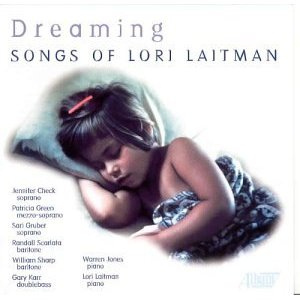 Lori's second solo album - Dreaming (Amazon, iTunes) - was released on May 1, 2003. The CD features singers Jennifer Check, Patricia Green, Sari Gruber, Randall Scarlata and William Sharp; doublebassist Gary Karr; and pianists Warren Jones and Lori Laitman.
Lori's second solo album - Dreaming (Amazon, iTunes) - was released on May 1, 2003. The CD features singers Jennifer Check, Patricia Green, Sari Gruber, Randall Scarlata and William Sharp; doublebassist Gary Karr; and pianists Warren Jones and Lori Laitman.
"This is a stunning collection of widely varied songs by one of the finest art song composers on the scene today...Lori Laitman deservedly stands shoulder to shoulder with Ned Rorem for her uncommon sensitivity to text, her loving attention to the human voice and its capabilities, and her extraordinary palette of musical colors and gestures.” (The Journal of Singing)
Mystery
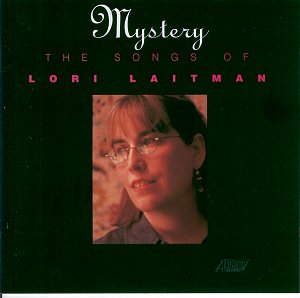 The first album comprised entirely of Lori's compositions, Mystery (Amazon, iTunes), was released August 1, 2000 on the Albany Records label, and features singers Phyllis Bryn-Julson, Lauren Wagner, and William Sharp; cellist Thomas Kraines; pianists Seth Knopp and Lori Laitman; and saxophonist Gary Louie.
The first album comprised entirely of Lori's compositions, Mystery (Amazon, iTunes), was released August 1, 2000 on the Albany Records label, and features singers Phyllis Bryn-Julson, Lauren Wagner, and William Sharp; cellist Thomas Kraines; pianists Seth Knopp and Lori Laitman; and saxophonist Gary Louie.
"Composer Lori Laitman knows how to let the voice soar and explore…spinning lyrical neo-romantic vocal lines over shifting post- modern sonorities." (Opera News)
Other Vocal Recordings
On the Naxos Records Label
The Secret Exit
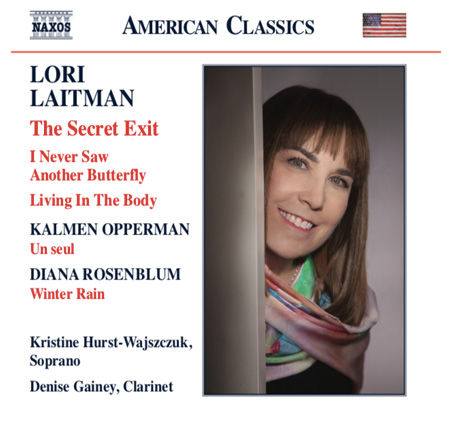
The Secret Exit was released by Naxos on May 19, 2020 and features soprano Kristine Hurst-Wajszczuk and clarinetist Denise Gainey. This is the premiere recording of The Secret Exit, which sets the poetry of Nobel Laureate Nelly Sachs, as well as the soprano/clarinet version of Living in the Body to poetry of Joyce Sutphen. A new recording of I Never Saw Another Butterfly is included, as well as the clarinet solo Un seul by Kalmen Opperman and Diana Rosenblum's Winter Rain, based on a Christina Rossetti poem.
"Although there are three composers represented here, it is the music of Lori Laitman that is the clear focus...Commissioned by the University of Alabama at Birmingham, Laitman's The Secret Exit (2017) was written for Hurst-Wajszczuk and Gainey...The texts are by Nelly Sachs, a German Jewish poet who escaped to Sweden in 1940 (and who won the Nobel Prize for Literature in 1966)...Hearing Hurst-Wajszczuk and Gainey work as one on these songs just underlines the music's power...I Never Saw Another Butterfly was written in 1995-96...the work uses texts by poems written by children in the Theresienstadt concentration camp. While Laitman takes musical ideas from the poetic text, they are never done obviously or clumsily...Laitman finds child-like tunes that somehow take on unbearable poignancy...One becomes aware of the space around the music, the undercurrent that has stolen innocence...Currently finishing a doctorate at the Eastman School of Music in Rochester, New York, Diana Rosenblum contributes Winter Rain, a reflection of her response to the Pacific Northwest winter via a poem by Christina Rossetti. I like the phrasing in the notes that Rosenblum "happens to be the daughter of Lori Laitman"; she certainly shares her mother's gift for poignant melody and finely-honed word setting. This is a haunting piece, a mere three and a half minutes long. It would be good to hear more from Rosenblum...This is a most moving selection of songs for voice and clarinet, beautifully recorded; music to touch both heart and spirit." Colin Clarke, Fanfare Magazine (March/April 2021).
"An entire disc solely devoted to art songs scored for solo voice and clarinet might sound like a maddening exercise in monotony. Fortunately, what is presented here is a poignant and deeply expressive array of songs that draw deeply affecting beauty from the sparse texture that many composers would find to be a crippling and frustrating limitation. Lori Laitman's central greatness comes not from wielding numberous and complicated elements in complex ways, but rather from her almost uncanny skill for breathing new life into a text through music. When it comes to crafting art songs, nothing else counts at all if this central matter isn't right. Laitman's skill in this regard is unsurpassed among current art song composers, and the spare texture of these particular songs actually uderscores this facet of her artistry...The best known work here is I Never Saw Another Butterfly..What is especially poignant about the tetxs that comprise Laitman's composition is that they were written by some of the children of Terezin, and most of them did not live to walk out of the camp alive. One might expect such a work to be one of unrelenting bleakness and sorrow, but it is in fact a work brimming with life, hope, and even humor from time to time...The Secret Exit from 2017 is comprised of three poems by [Nelly] Sachs that reflect on various facets of life and death...Sachs is brave enough to take us into the darkest and deepest sorrows of this world, and Laitman is brave enough to follow her there...Living in the Body is a work from 2001 that Laitman reshaped for voice and clarinet in 2018. The texts are by Joyce Sutphen, Poet Laureate for the state of Minnesota, who writes with a vibrancy that resonanates perfectly with Laitman...Alongside the poignancy are moments of levity and lightness that gives these songs their distinctive texture. As with everything else on this disc, one cannot help but be astounded by the endless reserves of Laitman's musical imagination as well as her unerring instincts for setting texts with sensitivity and grace...This is a very special release." Gregory Berg, The Journal of Singing (March, April 2021)
"The unusual scoring is effective, giving [the songs] a tone of resignation. Laitman writes gracefully for the voice." American Record Guide, Nov/Dec 2020
"The works on this Naxos release...hang together in quite a powerful way. They are, for one thing, conservative in tonality but not in form, engaging with their texts in free, original ways...The heart of the matter is that composer Lori Laitman's combination of detailed word-painting with serious subject matter is quite affecting. At the center of the program are two works that deal with the Holocaust, "I Never Saw Another Butterfly," setting texts written by children at the Terezin (Theresienstadt) concentration camp, and its sequel, "The Secret Exit," on poems by German Jewish writer Nelly Sachs. These draw the listener in with their vivid evocation of the texts and allow their full emotional impact to develop. The other Laitman cycle, "Living in the Body," sets texts by popular poet Joyce Sutphen and is less grim, but is cut from the same cloth. The Laitman songs are effectively framed by Kalmen Opperman's somber clarinet solo, "Un seul," and the more hopeful "Winter Rain," of Diana Rosenblum. The performances by soprano Kristine Hurst-Wajszczuk and clarinetist Denise Gainey are inward and focused, and Naxos' sound, from an auditorium at the University of Alabama-Birmingham far exceeds the usual standard of university venues: it is clear and intimate. This is a fine addition to the repertory of music that takes up the subject of the Holocaust." James Manheim, Allmusic.com
"The spare, sinuous way in which Laitman interweaves soprano and clarinet is often strangely enchanting." BBC Music Magazine, September 2020
Living in the Body
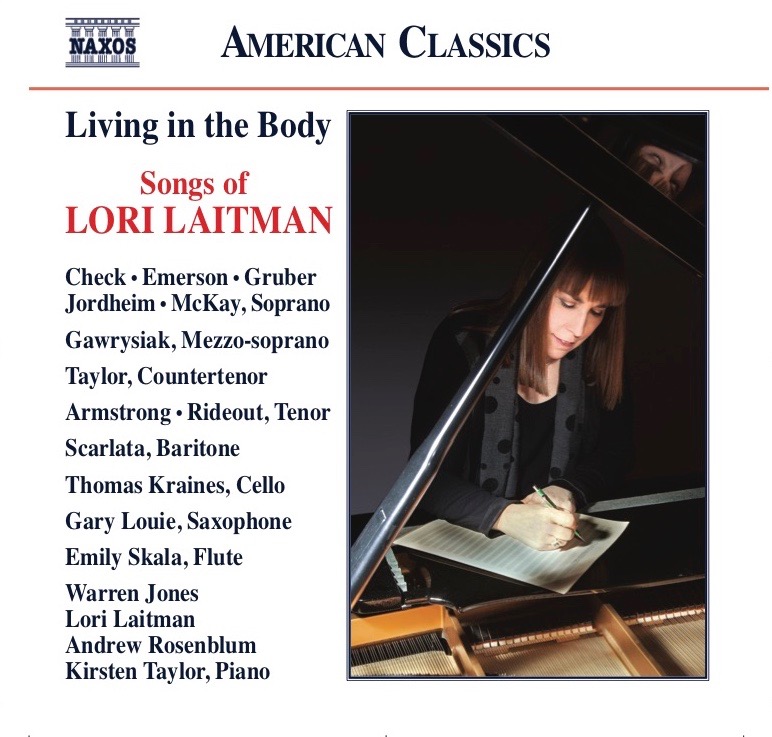
Living in the Body
This new double CD was released by Naxos on December 13, 2019. It features 49 songs composed between 1997 and 2017 to texts by celebrated poets including Elizabeth Bishop, Paul Celan, Dana Gioia, David Mason, Sylvia Plath, Joyce Sutphen and others. The topics range from the profound emotional impact of the Holocaust, to the humorous truths of everyday life, and the comedy and tenderness of childhood. The set also includes two works for saxophone and piano. This stunning program of world premiere recordings is performed by an all-star cast, including the composer herself.
Here is Gregory Berg's review from the May/June 2020 issue of The Journal of Singing:
Lori Laitman is one of America’s most prolific, accomplished, and admired art song composers, but the informal biography on her website tells the astonishing story of how she might not have ever entered the arena of art song in the first place were it not for the relentless insistence of soprano Lauren Wagner, her good friend and former roommate. In 1991, Wagner won a Concert Artists Guild competition that would give her the opportunity to make her first professional recording. Wagner reached out to Laitman, her friend since their days at Interlochen, and begged her to compose something that Wagner could sing for her debut CD. At this point, Laitman was strictly a composer of instrumental music with no idea how one went about composing a serious art song. Anxious not to disappoint her friend, Laitman began looking through books of poetry in search of a text that might inspire her. Before long, she found herself drawn to the work of Sara Teasdale, and by the end of the year Laitman had set Teasdale’s “The Metropolitan Tower” to music. Amazingly, Laitman’s very first art song was nothing less than a masterpiece, and it was just the spark of what would become a truly glorious career. Almost three decades and more than three hundred songs later, Laitman’s creative flame shows no signs of flickering. Whether in the intimate context of art song or on the more expansive canvas of opera, Lori Laitman continues to create vocal mu- sic of the very highest standard. Thank goodness for the determined friend who would not take no for an answer.
This two-disk set from Naxos, part of their highly regarded series called American Classics, is the result of several years of tireless and diligent work by Laitman to create recordings of her songs that had not yet been committed to disk. As if this weren’t already a formidable undertaking, she was also determined to rerecord those songs that had been revised since receiving their initial recordings. Thus, every one of the more than fifty pieces contained on these disks is either a world premiere recording or in some way a new recording. They span twenty years of her career and represent a dizzying array of colors, moods, and textures. Needless to say, a project of these dimensions does not come together easily nor quickly. The actual recording sessions back in 2017 were followed by months of editing, ordering of tracks, and crafting of program notes. The result of all this work is a monument to excellence and a potent reminder of the mysterious magic that occurs when poetry and music are combined with such mastery and such love.
This release is powerfully moving even before one has listened to a single measure of the remarkable music it contains. The program notes, lovingly crafted by the composer herself, testify to the rich web of relationships that are the very essence of a career like Laitman’s. Every one of these works sprang from someone’s desire for a new piece of music to enter the world. In some cases, it was a commission to honor someone’s memory or to support an important cause. In other cases, it was a gifted singer in search of something new and exciting for them to perform. Some of the stories shared in these program notes are of projects that fell dormant for one reason or another, only to be revived down the road and given new life. In one instance, it was a misunderstanding with a poet that caused access to a particular poem to be withdrawn, but which led the original song to be reconceived as a poignant instrumental piece for saxophone and piano titled “Journey.” The stories behind many of these works speak to the unpredictable nature of the creative life where carefully laid plans are sometimes discarded in favor of the reinvigoration of new possibilities.
Sadly, there is no way to chronicle all of the musical glories to be found in these two disks, but several overarching themes are paramount. One is Laitman’s uncanny ability to enhance the intrinsic qualities of every text she sets to music. From the pungent verse of Sylvia Plath to the sweeping beauty of a verse from Isaiah, Laitman’s music always draws us deeper into the text at hand. Another of her most important qualities is an unerring understanding of how the human singing voice operates and what kind of melodic lines bring out the best in voices. Laitman may have begun her musical life as a flutist, but she has a singer’s heart and a singer’s ear. She also knows how to craft music that will perfectly suit a particular voice. One of the clearest indications of that comes early on the first disk when we move from The Blood Jet, written for the gleaming soprano of Sari Gruber, to Sable Pride, which was composed for warmer, duskier sound of countertenor Darryl Taylor.
Again and again on these disks, we experience the perfect matching of music to voice. But the songs of Lori Laitman are about much more than what the singer gets to sing. Her piano accompaniments are exquisitely crafted in a way that makes them more than mere accompaniments while always supportive of the singer. Incidentally, one of the four fine pianists who are heard here to such great advantage is Andrew Rosenblum, who is one of the composer’s sons. But Laitman does not limit herself to the customary pairing of piano and voice. Living in the Body, which gives this release its title, is a setting of six poems by Joyce Sutphen that combines soprano voice with saxophone in a manner that sounds exactly right. This is one of several instances in which instruments other than piano are used to telling effect. It is also important to acknowledge the thematic range that this collection represents. We experience everything from the horrors of the Holocaust to the comic tedium of a second date. The world of poetry can take us anywhere, and when the words are set to just the right music, the journey becomes even more vivid.
Laitman shares helpful background information on every single work, and biographies are included of every musical participant. Full texts are available in an online supplement. This release is a treasure trove both for fans of the composer as well as for those who are discovering the riches of her work for the first time.
Here is the Fanfare Magazine review by Colin Stuart Clarke:
Lori Laitman proved herself a songstress extraordinaire previously, notably with the Albany disc Within These Spaces (Fanfare 33:1) and the Naxos release Vedem (Fanfare 35:2). Here is an act of generosity, a gift to the community of song: two well-filled discs of solo songs and duets, with the occasional solo instrumental piece.
This journey in song begins with two settings of the poet Joan Joffe Hall, “Illumination” and “The Joy of Uncreating”; the umbrella title is that of the second poem (2013, revised 2016). Premiered in 2018 with baritone and piano, they are heard here in a version for mezzo. One of many world premiere recordings presented here, the two songs immediately draw us into Laitman’s world. Song is her natural territory; the sheer flow of “Illumination” and the joy encapsulated in “The Joy of Unknowing” are addictive. Andrew Rosenblum is beautifully responsive to Laitman’s thoroughly idiomatic writing, while Margaret Gawrysiak is supremely confident.
The composer herself is pianist for The Blood Jet (2010, revised 2017), a setting of four poems by Sylvia Plath; the soprano Sari Gruber is also the work’s dedicatee. Spreading to some quarter of an hour, the effect is that one is able to immerse oneself fully in this miraculous world. The delicious serenity of “Morning Song” cedes to the expressive “The Rival.” But the true power of this cycle resides in Laitman’s portrait of depression, “Kindness,” wherein the piano part is cut down to a minimum. The final song, “Balloons,” is intriguing. The poet memorably refers to balloons as “oval soul animals”; there is a deeper aspect to this song, although levity certainly surfaces. Yet the song’s closing gestures, with notes from the piano’s treble falling like water droplets, remain infinitely touching.
Poetry by Harlem Renaissance poet Countee Cullen forms the basis of Sable Pride (2013, revised 2017). It was commissioned by the present performer, countertenor Darryl Taylor, whose fruity, full sound seems perfect. The second poem, “Incident,” points up the power of words, with the “N”-word provoking huge emotion in the protagonist, who, out of a whole summer in Baltimore, only remembers that one incident when he was insulted in that manner. Laitman’s use of the lower reaches of the piano is most effective before the far more settled portrait of harmony and love in the final “Tableau.”
The setting of a portion of Isaiah constitutes Laitman’s sole Biblical setting, And I Will Bring Them (2001, revised severally). It is beautifully tender, with a Jewish slant to its harmonies. Taylor’s strong voice suits the intensity of the belief encapsulated in the text to perfection.
The name Vale Ridout is new to me, but this particular tenor’s expertise in Laitman’s Two William Carlos Williams Songs (1997, revised 2008 and 2017) is exceptional. The two songs provide a striking contrast, with the more serious first one ceding to a jazz-inflected successor.
The twofer takes its title from the next song-cycle, Living in the Body (2001, revised 2017), a sequence of six songs to texts by Joyce Sutphen, the current Poet Laureate of Minnesota. The first thing to notice is the lack of a piano; this is scored for soprano and saxophone and was premiered by the Arden Duo (Sandra McLain and Carolyn Bryan) in 2002. Here, it is Maureen McKay and the haunting alto sax of Gary Louie that do the honors. The themes are love, memory, and resilience as a woman ages. Touchingly, the second song (titled, as is the cycle, “Living in the Body”) is the poem the composer read at her mother’s funeral. One can only imagine the resilience that took from Laitman, but if her personality is anything like her music, I imagine it was done with both love and the utmost dignity. The poem is astonishingly touching: Lines such as “No forwarding address,” the final words, cut to the quick. But there is humor there, too: the body as something that will “demand apples and coffee and chocolate cake” (although personally I’d only take the apples if they were in the chocolate cake). McKay takes on a positively trumpet-like delivery when that instrument is mentioned at the lines “Let the rainy sky be filled with jazz: drizzling saxophones, rivers of trumpet, xylophone pools.” Yet maybe it is the haunting lament of the final “Crossroads” that lingers in memory the most.
It was the well-known singer Wolfgang Holzmair that commissioned Todesfuge (Death Fugue, 2010, revised 2013), a setting of Celan that shows Laitman is unafraid of any subject. “Der Tod ist ein Meister aus Deutschland” says the text; “Death is a master from Germany.” An unremitting march is at the heart of this setting for the unusual combination of male voice and cello (baritone Randall Scarlata and cellist Thomas Kraines). There are elements that reflect fugue in the text, and Laitman responds to them. In total contrast comes ’Tis Philosophy (2011, revised 2017, words by Emily Dickinson), a calm meditation on the mystery of time and how we as humans deal with it. Laitman’s frequent collaborator Sari Gruber is the fine soprano.
A cycle of five poems, Five Lovers (2004, revised 2017), sets texts by Jāma Jandroković, who incidentally was also the soprano solo at the premiere in 2005 in New York. The journey here is that of a newly divorced woman in New York City. There is something of a Schumannesque lyricism to the lines, with Alisa Jordheim’s delivery as fresh as a daisy. There are bucket-loads of truth here in “Second Date”: the unspoken thoughts in stark counterpoint to the social norms and conventions. The bittersweet atmosphere that Laitman is so expert at creating is heard in its full glory here.
From poetry to letters, and Laitman’s first setting of a letter (by Mike Gioia): Dear Future Roommate (2015, revised 2017). I particularly enjoyed the sentiment that English people all drink Earl Grey tea and eat soggy crumpets (it’s more builder’s tea and toast), but actually the whole letter is hilarious. It’s a treat that the singer gets to whistle, too: Tenor Vale Ridout is brilliantly bonkers, with the composer also clearly having fun at the piano. The first disc closes with What You Wanted (2011, revised 2017), to a text by Joyce Sutphen about the vagaries of the postal system (it’s nice to know that such problems are not just in the UK) and the power of the impulse purchase.
The glorious flow of I Am in Need of Music (1999, revised 2017), a duet for soprano and baritone, is the perfect start to the second disc. Andrew Rosenblum’s contribution on piano is particularly warm and inviting, due in no small part to his harmonic awareness. The text is from the 1929 poem Sonnet by Elizabeth Bishop. The texts for the three-song cycle On the Green Trail (2007, revised 2017) are similarly taken from a larger source, this time Jeff Gundy’s Deerflies. A celebration of the beauty of the world and of nature, Laitman’s setting honors these sentiments with real tenderness: The deceptive simplicity of the second song, “Looking at my hands,” contains whole worlds, rising to a climax that asks us to fight for what is good, while a hymnic aspect to “Small Night Song from Oneonta” reflects its adaptation of a Mennonite hymn.
The haunting Journey for alto sax and piano (2008) is more than just an interlude; it is (actually in this case literally) a song without words: It was composed as a song but the permission to use the words was retracted, so the melody was recycled (in the best possible way) for this soulful little offering. Alto saxophonist Gary Louie is as near to being vocal as an instrument can get, eloquent, perfectly in tune—altogether splendid. Later, Lullaby (2000), for the same combination of artists, performs a similar function between two different cycles. (I wonder if I can detect a French influence on this latter piece?)
That piece is sandwiched by two song cycles, the second of which is River of Horses (2005, revised 2017) to poems by Baudelaire, James Wright, and James Dickey, plus a traditional Navajo song. The Baudelaire is sung in English. Perhaps the most touching is the extended second song, “A blessing,” at the end of which, after the horse comes up to the protagonist and nuzzles him, there is a realization for the narrator that if they stepped out of their bodies they would break into a blossom. This is truly lovely, both poetically and in Laitman’s tender setting. A nursery rhyme-like lilt characterizes Laitman’s setting of a Navajo song, “The War God’s Horse Song.” This is the first appearance of soprano Jennifer Check on the twofer, and she sings with an art which conceals art.
The duet (Ashley Emerson and Dominic Armstrong) The Act, to a text by H. L. Hix (2010, revised 2017), concerns the dynamics between two members of a knife-throwing circus act. Laitman’s setting includes moments of tenderness as well as drama. This is a terrific little scena that would enliven any duet recital.
The emphasis of the second disc on musical partnerships continues with Laitman’s 2007 setting of The Silver Swan (yes, to the text by Orlando Gibbons). Set for voice, flute, and piano, with beautifully eloquent contributions from Maureen McKay and flutist Emily Skala, and with the composer at the piano, it is shot through with reflective beauty. Margaret Gawrysiak and Randall Scarlata combine in On a Photograph (2004, revised 2017), a setting whose conversational tone and long lines (reflecting the poem by John Wood itself) reflects the whimsy of the imaginings of the protagonists over the lives of two people in an old photograph.
Jennifer Check and Warren Jones, who had shone in River of Horses, reunite for the cycle The Soul Fox (2013, revised 2017) to poems by a frequent collaborator of Laitman’s, David Mason. Laitman deliberately uses a female voice to narrate a male story of the end of a marriage brought about through lying and temptation, adding an extra layer. (Hearing Frauenliebe und -leben sung by a female has a somewhat similar effect, perhaps?) Of course it means that when the female temptress in “Sarong Song” is quoted, we do actually hear a female siren voice. Laitman’s setting is searing in a less-is-more sort of way. We hear the events, we watch with our internal eye, we feel pain. The setting of “Night Song” is particularly memorable; the piano’s high, repeated phrase is like an encrustation of starry pain. The piano contribution to “The Soul Fox,” the final poem, seems like a slowed–down, lachrymose version of that phrase.
Laitman herself is the poet for Short Songs for Edward, written for her grandchild Edward Milton Rosenblum in 2017. Each poem is a tiny sliver of joy (as long as one is fine with a song called “When you have to make a poo”; I am, at least). The gentle simplicity of “Sometimes you get a boo-boo” is lovely. Maureen McKay seems to have fun; and, continuing the idea of fun, the twofer closes with a cabaret song, to a poem by Dana Gioia (potentially the first of a series), You Leave Me Bent, written in 2016 and revised the following year. There is a verse and a chorus in this appetite-whetting offering; there is wit and a light touch, too.
Detailed notes are provided by the composer herself; texts are available online at Naxos’s website. Throughout, Laitman’s choice of poets speaks of an intellect and soul in perfect attunement. Purely in poetic terms, this is a splendid compendium. The recording (over a number of different venues and dates) is excellent throughout. Touchingly dedicated to the memory of the composer’s parents, this set is required listening for any lover of the art song. Colin Clarke
To purchase the CD, please click here.
The Scarlet Letter
To purchase this CD, please click here.
The Scarlet Letter received its professional world premiere in May 2016 with Opera Colorado, under Greg Carpenter’s visionary leadership. A generous grant from The Sorel Organization enabled us to capture the live performance for this CD, which Naxos released in August 2017.
Fanfare Magazine's James H. North named The Scarlet Letter one of the top 5 CDs of 2018 in its Nov./Dec. 2018 issue:
Lori Laitman writes brilliantly scored music; it’s been a while since I’ve heard such a colorful new American opera. It has many other virtues as well: eminently singable vocal lines in which the words are easily understood—unusual even in English, a credit to the composer and to librettist David Mason as well as to the singers—plus a convincing movement along a dramatic course.
Hester is a dramatic, lyric, coloratura soprano rolled into one; Laura Claycomb is a powerful vocal actress and soars through the high tessitura. Both men handle their more limited roles carefully, with superb diction but artificial, operatic accents. Dimmesdale finally has a strong aria as he confesses and dies; tenor Dominic Armstrong rises to the occasion. © 2018 Fanfare
In January, 2018, Opera News named The Scarlet Letter a "Critic's Choice" — As Hester, Laura Claycomb is the work’s shining center. Her soprano is supple and womanly, but its agility, especially in the upper reaches, projects an innocent purity that reaffirms Hester’s moral north star. Laitman writes riskily for her heroine, with important text couched in high-flying lines. It’s difficult to know if other, less nimble sopranos would be as intelligible, but Claycomb is always clear, affecting and sympathetic. Even before the madness of Dimmesdale’s self-dramatizing death, tenor Dominic Armstrong’s aggressive, overwrought delivery lends the tormented minister an unstable, almost villainous cast—not inappropriate, given the character’s moral ambiguity. Malcolm MacKenzie’s dignified baritone makes Chillingworth a ramrod-straight, implacable force, riven with self-loathing. Mezzo-soprano Margaret Gawrysiak is convincingly menacing as the unhinged local harpy, although her unwieldy vibrato makes both words and melody difficult to parse. As the town elders, tenor Kyle Knapp and baritone Daniel Belcher add a revealing layer of prurient interest as they badger Hester to name her lover. The choral singing is particularly strong, and the orchestra, led by Ari Pelto, is polished and precise. © 2018 Opera News
In October 2017, Donald Rosenberg of Gramophone Magazine reviewed the CD, writing: "Nathaniel Hawthorne's novel The Scarlet Letter has inspired several operas, including rarely performed versions with music by Walter Damrosch, Fredric Kroll and Margaret Garwood. The most recent, Lori Laitman's rapturous adaptation set to elegant verses by David Mason, received its world premiere in May 2016 by Opera Colorado. The Naxos recording of the work is drawn from those initial performances, which — at least in purely sonic terms — appear to have done great honor to this deeply affecting creation.
The first thing that leaps into one's ears is the sheer beauty of the music. Laitman has devoted much of her career to the art song, and her ability to meld words with lyrical, often soaring lines is on abundant display in her opera. The score pinpoints the distinctive qualities of the characters. Hester Prynne, forced to wear the letter 'A' as a symbol of her adultery, sings in urgent, rhapsodic phrases, while her lover, the Reverend Arthur Dimmesdale, ranges from anxious reflections to dramatic outbursts, and Roger Chillingworth, Hester's estranged husband, strikes sinister notes on his vengeful path. The people of the Puritan community reveal their moral pretensions in passages of reverent rigidity.
The Opera Colorado production benefits from the presence of splendid principal singers and a fine chorus. Laura Claycomb uses her radiant soprano to poignant effect, especially when revealing the woman's strength in the vocal stratosphere. As Dimmesdale, tenor Dominic Armstrong is forceful and touching and baritone Malcolm MacKenzie brings grave intensity to Chillingworth. Mezzo-soprano Margaret Gawrysiak is a vibrant terror as the town witch, Mistress Hibbons.
Led by Ari Pelto, the Opera Colorado Orchestra play Laitman's score with the refinement and urgency needed to catapult this impressive and fervent opera."
In November 2017, John Campbell of Artsong Update reviewed the CD, writing: "The powerfully expressive music was enthralling, from its choral beginning to the shattering end. Lori Latiman's music is lyrically expressive, capturing the intricate psychology of three flawed people in an early American setting. The music is dense, complex and intense, using instrumental colors to illuminate penetrating psychological insights and vivid characters. Drawing on her wide experience of writing art songs, Ms. Laitman has crafted a rich opera of great depth. Out of her understanding of how to set the voice she has created a stunning opera for the 21st century."
Records International reviewed the CD in August 2017 —
Laitman is one of the most prolific and fluent song and opera composers of our time, with a gift for effortless melody and for getting to the emotional heart of her texts. In her opera on Hawthorne’s classic novel she is greatly assisted by David Mason’s supremely skilful rendering of the story into verse. Laitman’s lyrical, eloquent score, firmly tonal, belongs to the tradition of the great opera composers of the past, with vividly portrayed characters whose dramatic trajectory and development is reflected in music so finely descriptive as to render staging all but redundant. Dimmesdale’s progressive disintegration of spirit, Chillingworth’s duplicitous self-deception and above all Hester’s resolve and strength of character are presented as a psychological drama of devastating insight through the power of meticulously crafted dialogue and exquisite musical color and shading. This is not a work of introverted self-examination, though; the judgmental societal mores of the day provide a dramatic backdrop in powerful choral scenes and the interaction of secondary characters. © 2017 Records International.
After Life
In Sleep The World Is Yours was commissioned by Music of Remembrance, premiered in May 2014, and Naxos released the CD in February of 2016. This song cycle sets three poems by the talented young poet Selma Meerbaum-Eisinger, who died at age 18 in a Nazi labor camp. The CD also includes the premiere recording of the one-act opera After Life, with music by Tom Cipullo and a libretto by David Mason.
The song cycle is performed by soprano Megan Chenovick, oboist Benjamin Hausmann and pianist Mina Miller.
"Lori Laitman’s In Sleep The World Is Yours is a set of three songs to texts by Selma Meerbaum-Eisinger, who was born in Romania and met a tragic end in a Ukrainian labor camp when she was eighteen. Happily, her poetry survived. Laitman, who uses the unusual combination of soprano, oboe, and piano for this cycle, seems deeply connected to the words, which are clear and straightforward but brimming with emotion. Her melodic and lyrical music is enveloping but also imaginative and penetrating, especially in the concluding “Tragedy,” in which the poet realizes she will “fade like smoke and leave no trace.” Megan Cenovick matches Laitman’s empathy with her comforting, nuanced soprano. Benjamin Hausmann (oboe) and Mina Miller (piano) contribute with sensitivity. The poet’s voice in these three songs and the Girl in Cipullo’s After Life resonate movingly and meaningfully with each other.” (Joshua Rosenblum, Opera News, July 2016)
”Laitman chose three poems and set them for soprano, oboe and piano. The first, “Lullaby,” holds a bittersweet element in that it was dreams that held the only available escape for some in those days….Laitman’s writing reflects this unease within what is traditionally a form that provides a feeling of safety. The active beginning to “Yes,” the second poem to be set, reflects feelings of distance between loved ones; the music softens as the realization that it is memories that hold the key to closeness sinks in. The writing for oboe here seems particularly poignant, adding its own florid commentary. Finally, there comes “Tragedy.” The words are heartbreaking, and worth quoting in full: “This is the hardest: to give yourself away/and then to see that no-one needs you, to give all of yourself and realize/you’ll fade like smoke and leave no trace.” The singer initially can hardly get past the first word, “This”, and here, the piano and oboe parts are at their most fragmentary. It is telling that this poem has the least text of all three poems, but Laitman accords it the longest setting. Megan Chenovick, superb throughout, really allows her voice to soar in this final offering, while Benjamin Hausmann’s poignant pipings add an extra layer of regret for what might have been for this talented young poet whose voice was cruelly ended at far too early an age.” (Colin Clarke, Fanfare Magazine, July 2016)
”Lori Laitman’s 18-minute In Sleep The World is Yours is a simpler, more profoundly distilled response to the Holocaust in the form of a mother-and-child song-cycle set to elegiac lyrics by Selma Meerbaum-Eisinger, dead at 18 at a Nazi camp in Ukraine.” (Laurence Vittes, Gramophone Magazine, May 2016)
To purchase this CD, please click here.
Vedem
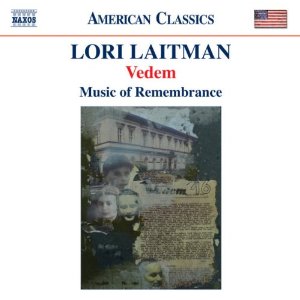 Vedem was commissioned by Music of Remembrance, premiered in May 2010 and the CD was released by Naxos in May 2011. This Holocaust-themed oratorio tells the remarkable story of a group of teenaged boys incarcerated in Terezin and their clandestine magazine entitled Vedem (Czech for “In the Lead”). The CD also includes the premiere recording of Fathers.
Vedem was commissioned by Music of Remembrance, premiered in May 2010 and the CD was released by Naxos in May 2011. This Holocaust-themed oratorio tells the remarkable story of a group of teenaged boys incarcerated in Terezin and their clandestine magazine entitled Vedem (Czech for “In the Lead”). The CD also includes the premiere recording of Fathers.
The music is performed by The Northwest Boychoir, under the direction of Joseph Crnko, mezzo-soprano Angela Niederloh, tenor Ross Hauck, clarinetist Laura DeLuca, violinist Mikhail Shmidt, cellist Walter Gray and pianist Mina Miller.
Click here to see more information from Naxos, as well as audio and video excerpts:
"[This CD] is a most touching experience, and one that further confirms Laitman’s status as one of the most talented and intriguing of living composers." (Fanfare Magazine)
"Laitman's text setting is straightforward and artful, allowing phrases that evoke memories of a happier life to land with neither irony nor an obvious attempt at emotional manipulation. Her flexible instrumentation, for clarinet, violin, cello and piano, is by turns insistent, warm and oddly hopeful, with filigrees of solo violin in traditionally Hebraic intervals.... It is yet another fine example of Laitman's gracious vocal writing and particular sensitivity to the complicated emotions that any reflection on the Holocaust is bound to conjure." (Opera News)
"...an intensely beautiful sound space..." "...a powerful retelling..." (Artsong Update)
For a Look or a Touch
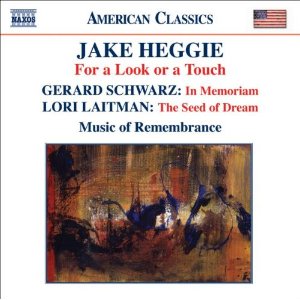 “The Seed of Dream,” Lori’s Holocaust-themed song cycle based on the poetry of Vilna Ghetto survivor Abraham Sutzkever, was commissioned by Music of Remembrance, and released in April, 2008 on the CD For a Look or a Touch (Amazon, iTunes). Baritone Erich Parce, cellist Amos Yang and pianist Mina Miller perform Lori’s work, which Dr. Sharon Mabry, in The Journal of Singing, declared “a masterpiece not to be missed!”
“The Seed of Dream,” Lori’s Holocaust-themed song cycle based on the poetry of Vilna Ghetto survivor Abraham Sutzkever, was commissioned by Music of Remembrance, and released in April, 2008 on the CD For a Look or a Touch (Amazon, iTunes). Baritone Erich Parce, cellist Amos Yang and pianist Mina Miller perform Lori’s work, which Dr. Sharon Mabry, in The Journal of Singing, declared “a masterpiece not to be missed!”
Also on the CD is Jake Heggie’s song cycle “For A Look or A Touch” and Gerard Schwarz’ In Memoriam, scored for solo cello and string quartet.
“Laitman has an uncommon ability to breathe new life into a text with her music without obscuring its original essence, and she demonstrates that sensitivity here to a remarkable degree….Baritone Erich Parce sings these songs with understanding and great care, and he has invaluable collaborators in MOR founder Mina Miller at the piano and Amos Yang on cello. These three musicians achieve remarkable magic here and these beautiful and important songs deserve nothing less.” (The Journal of Singing)
Brundibar
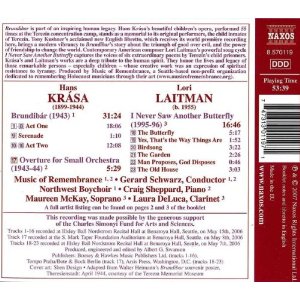 Music of Remembrance’s Brundibar (Amazon, iTunes) recording on Naxos was named as one of the top ten opera recordings of 2007 by Opera News. On the same CD is the premiere recording of Lori’s "I Never Saw Another Butterfly", as arranged for soprano with clarinet. Maureen McKay and clarinetist Laura DeLuca perform this work on this December 2006 release.
Music of Remembrance’s Brundibar (Amazon, iTunes) recording on Naxos was named as one of the top ten opera recordings of 2007 by Opera News. On the same CD is the premiere recording of Lori’s "I Never Saw Another Butterfly", as arranged for soprano with clarinet. Maureen McKay and clarinetist Laura DeLuca perform this work on this December 2006 release.
“[The six songs] are performed beautifully here by soprano Maureen McKay and clarinetist Laura DeLuca. The poems show that the children were well aware of their surrounding, and perhaps their fate; and the songs have a haunting quality that stays with the listener.” (American Record Guide)
Between The Bliss and Me — Songs to Poems of Emily Dickinson
For more information, please click here
“Faulkner has a gorgeous, plush voice…Lori Laitman's I gained it so is deftly structured.” (Opera News, 2013)
“We also have a single song extracted from a cycle Between the bliss and me by Lori Laitman, oddly enough the only female composer here, and one by Richard Pearson-Thomas; both are beautifully poised little settings…” (Music Web International, 2013)
More
Before She Became Fire
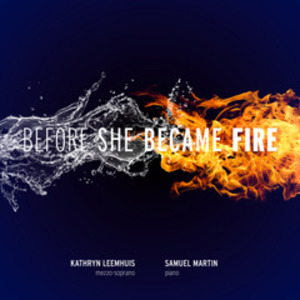
Mezzo-soprano Kathryn Leemhuis, accompanied by pianist Samuel Martin, released this CD Sept 14, 2023 on the BCM&D Records label. The recording features Lori's And Music Will Not End, a short cycle with poems by Anne Ranasinghe and John Wood — here recorded for the first time in the mezzo-soprano version. The CD also includes the premiere of Lori's Presence, to a poem by Marcia Menter. This haunting poem was written in memory of poet Susan de Sola.
Laura Strickling's 40@40
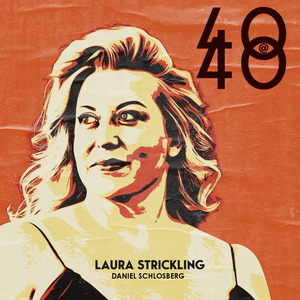
Soprano Laura Strickling's 40@40 CD was released on the Bright Shiny Things label on August 18, 2023. Accompanied by pianist Daniel Schlosberg, the CD features the first 20 of the 40 compositions Laura commissioned for her 40th birthday. Lori's song, Thanks a Latte, to a poem by Caitlin Vincent, is included.
Lori Laitman sets Caitlin Vincent’s “Thanks a Latte” in an arioso that adroitly moves through various sections and tempos that respond to the poem with skilful text-painting. Laitman gives Strickling ample opportunity to explore drama and humor. The soprano has fun with the song, providing a welcome diversion from the moodier pieces. — Sequenza 21
Decho Ensemble

The Decho Ensemble is comprised of saxophonist Jacob Swanson and soprano Katherine Petersen. Their debut CD was released on September 15, 2023. To hear their exceptional rendition of Living in the Body (my cycle to poems of Joyce Sutphen), please click here.
American Composers at Play
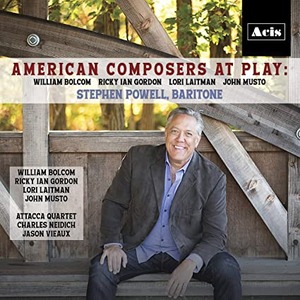
2021 Grammy nominee for Best Classical Solo Vocal Album
Stephen Powell's American Composers at Play features the works of William Bolcom, Ricky Ian Gordon, Lori Laitman and John Musto, who all accompany Powell on their compositions. The CD was released on August 25, 2020 by Acis Productions. The Attaca Quartet, clarinetist Charles Neidich and guitarist Jason Vieaux also join.
Podcast: Classical Conversations - Stephen Powell: American Composers At Play
Journal of Singing, March/April 2021
This album ... is a masterfully conceived and executed celebration of modern American art song that ranks with the finest such recordings…Powell’s concept was to choose four living art song composers who could also collaborate with him as pianists for their respective works. Powell could not have asked for finer artistic partners than William Bolcom, Ricky Ian Gordon, Lori Laitman, and John Musto, four of our greatest living song composers…Lori Laitman is entrusted with the first track of this disc, and “The Wind Sighs” from her opera Ludlow is just the poetic opening that this marvelous collection deserves. At the other end of the expressive spectrum is the saucy fun of “Money,” Laitman’s sparkling setting of a delightful poem by Dana Gioia, the librettist for Laitman’s opera The Three Feathers and a poet to whom Laitman has repeatedly turned for inspiration. Perhaps the single most sublime song in this collection is Laitman’s “If I. . . . ,” an exquisite setting of the Emily Dickinson’s classic poem that climaxes with the refrain “I shall not live in vain.” Laitman’s loving treatment of this text epitomizes her greatness as a composer of songs, and Powell sings it gloriously. As for rollicking fun, it can be found in Laitman’s Men with Small Heads, featuring the wonderfully offbeat texts of Thomas Lux. Laitman reveals in the liner notes that she approached these texts with a bit of trepidation; one would never guess from the assurance of these settings.
Fanfare Magazine, March/April 2021
Lori Laitman's songs are unfailingly lyrical, and direct in their expressiveness. The first item is the Poet's aria, "The Wind Sighs," from Laitman's opera Ludlow...Ludlow is based on the infamous Ludlow Massacre of 1914 in Colorado, when striking coal miners were gunned down by National Guardsmen on the orders of the mine owners. "The Wind Sighs" is elegaic and heartbreakingly beautiful; it is sensitively sung by Powell...Overall, this collection encompasses a full range of eomtions communicated by four of our finest composers for voice in the era after Samuel Barber and Ned Rorem...Powell's singing is superb."
Gramophone Magazine, January/February 2021
Judged on artistic terms alone, Stephen Powell’s interpretations make for a deeply satisfying solo debut recital album. His achievement is all the more extraordinary for resonating so compellingly with our historical moment. The American baritone, who comes to this project after decades of experience as an opera performer, has put together a thoughtfully chosen, deeply felt programme of contemporary vocal writing by four of his compatriots...The composers in question are Lori Laitman, Ricky Ian Gordon, John Musto and William Bolcom, each the creator of a distinctive and prolific output of works for the voice...Yet another brand of humour, wildly imaginative, populates Laitman’s Men with Small Heads, a cycle setting poet Thomas Lux’s vividly eccentric snapshots of mid-20th-century America...Powell’s vocal and theatrical versatility comes into play throughout the album – in ways, as he points out, that have liberated his own ‘American voice’. — Thomas May.
Opera News, February 2021 — A "Critic's Choice"
Stephen Powell's new album proves superb in both concept and execution — it's one of the most interesting recitals of American song repertory in years...This 2020 project involved colaborating musically with four living exponents of American art song — William Bolcom, Ricky Ian Gordon, Lori Laitman and John Musto...Laitman's lovely "The Wind Sighs" derives from her opera Ludlow...Along with Laitman's four-song cycle "Men with Small Heads (2000) — slyly composed to Thomas Lux poems drolly evoking 1950s America — the most intriguing repertoire here is Bolcom's 2009 string quartet-accompanied "Billy in the Darbies," a version very different in tone and emphasis from Britten's Schubertian scene in Billy Budd...Powell's blue-chip vocalism throughout showcases sterling legato, a wide dynamic range — including ringing forte high notes — and the ability to access head voice and even falsetto (in one Laitman number, when channeling a child)...The composers all prove accomplished pianists and also furnish booklet commentary on the music and set texts, and all the instrumental contributions are first-rate. — David Shengold
American Record Guide, January/February 2021
It would be hard to find a better album of contemporary American songs than this. The program gets off to a poignant start with an aria from Lori Laitman's opera Ludlow, which tells the story of the Ludlow Massacre in the 1913-14 coal-mining wars of southern Colorado when more than a dozen innocent people, mainly women and children, were killed when the Colorado National Guard burned down the tent colony of the strikers protesting brutal conditions. Later we hear her set of four off-beat songs, Men with Small Heads, a lovely setting of Emily Dickinson's If I with piano and clarinet accompaniment, and the humorous song Money about its ubiquitous power. I've reviewed her songs before...and fine them exceptionally fine. — Robert Moore
Oberon's Grove, October 13, 2020: Stephen Powell ~ American Composers At Play
Even before the singing starts, the crystalline piano figuration that opens Lori Laitman's The Wind Sighs (from her opera LUDLOW) lures the ear. Mr. Powell then begins to sing, movingly expressing the text, by David Mason, which tells of the land and the sky of Colorado. At "...into the blue" the singer's tone is suffused with tenderness, sending the first of several chills up my spine; then the voice turns mighty at "...the eyes of Heaven". The song ends powerfully, mourning the blood shed by the immigrants who built this country. I found several songs to love on this disc, but The Wind Sighs is one that I came back to several times...Oberon's Grove: Stephen Powell ~ American Composers At Play
In Lori Laitman's cycle Men With Small Heads, I found so many associations from my youthful years in the poetry of Thomas Lux. The poet was born in 1946, two years before me, which must account for the shared visions his writing summons forth: the mere mention of Maraschino cherries made me laugh out loud.
In the cycle's title song, Mr. Powell relishes the droll lyrics, the voice capturing the colours of this small-town panorama. Next is the hilarious Refrigerator 1957; this scene could have been set in my mom's kitchen, as every reference brings forth a memory. The poet's description of the "...heart red, sexual red, wet neon red..." of the Maraschino cherries is spot on: how often I would snitch one from the half-full little jar. Ms. Laitman, at the piano, savours the wit and occasional waltziness of her score, whilst Mr. Powell brings this slice of 1950s Americana into vivid focus, making it feel like he's singing directly to me.
A Small Tin Parrot Pin brings more recollections: a piece of cheap jewelry could become a childhood treasure (mine was a ring I had found one day, which I believed could cast spells on people I hated. At least once, it worked.) The significance of the pin to its owner is wonderfully detailed in Mr. Lux's poetry, again rendered so perfectly by the singer.
In Snake Lake, the Lux poem could have been written with me in mind: snakes have always terrified me. The poet provides cover for us ophidiophobes: "There is no shame in avoiding what will kill you." From start to finish, this Laitman/Lux cycle pleased and charmed me, and I can't imagine it better done than by the Powell-Latman duo...Oberon's Grove: Stephen Powell ~ American Composers At Play
Lori Laitman turns to one of Emily Dickinson's loveliest poems for "If I...", in which Charles Neidich joins Mr. Powell; together they captivatingly serve up the melodious flow of the song, which Ms Laitman wrote for her father on his 80th birthday. This song brings the blessèd assurance of the quiet joys of human kindness, something so many people seem to have forgotten in this day and age...Oberon's Grove: Stephen Powell ~ American Composers At Play
Ms. Laitman's Money, words by Dana Gioia, features several timeless catch-phrases about cash. The song has the feel of a carnival barker's cries.
From Broadway World, October 27, 2020 by Erica Miner:
"Thoughtfully programmed and splendidly executed, the recording is worthy of the highest praise, starting with unconditional admiration for Powell's baritone voice, which sounds as glorious as ever...The program opens beautifully with Lori Laitman's "The Wind Sigh," Poet's aria from Act 1 of Ludlow (2012). This lush, passionate composition reflects a poet's musings about the arroyos of Colorado, which he remembers from his childhood, and expresses regrets about the loss of his youth and its familiar places. "The blue was cold...the red was blood...of the immigrants." The vocal range drifts into baritenore territory; Powell negotiated the very high tessitura with ease and great beauty...The clever lyrics in "Men with Small Heads" poke fun at human nature and add comic interest with the singer's falsetto...Laitman's "Money" is the most operatic of the works, and Powell spins every note and word as if born to them; perhaps he was."
Transparent Boundaries
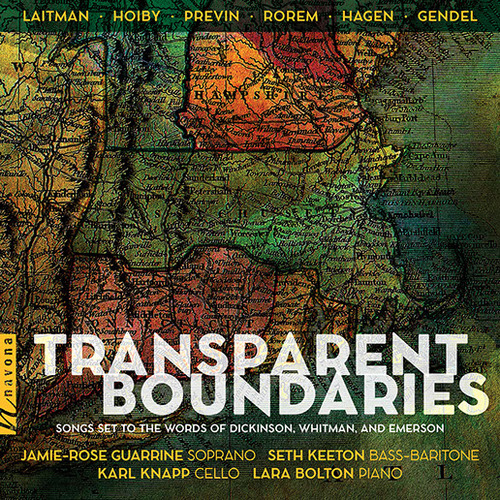
Transparent Boundaries features songs set to the words of Emily Dickinson, Walt Whitman and Ralph Waldo Emerson, by composers Lee Hoiby, André Previn, Ned Rorem, Daron Hagen, Scott Gendel and myself. In addition to a beautiful rendition of my Dickinson cycle One Bee and Revery (performed by Jamie-Rose and Lara), the CD includes the premiere recording of Beauty (commissioned by the artists), which sets an excerpt from Emerson's essay "The Poet" — scored for soprano, bass-baritone, cello and piano.
The CD was released on June 12, 2020 by Navona Records. For more information, please click here.
The Journal of Singing, January/February 2021
This is an utterly absorbing collection of superb art songs from a truly impressive sextet of composers: Ned Rorem, André Previn, Lori Laitman, Lee Hoiby, Daron Hagen, and Scott Gendel. But for all the excellent music contained herein, what elevates this project to exceptional greatness are the texts of the three poets whom it honors: Ralph Waldo Emerson, Emily Dickinson, and Walt Whitman...Emerson's representation is limited to the opening track of the release, but it is perhaps the most gorgeous music heard here. Lori Laitman's Beauty is a lush, heartfelt setting of a text from Emerson's The Poet that is breathtakingly beautiful even without music:
Wherever snow falls, or water flows, or birds fly, wherever day and night meet in twilight, wherever the blue heaven is hung by clouds, or sown with stars, wherever are forms with transparent boundaries, wherever are outlets into celestial space, wherever is danger, and awe, and love, there is Beauty, plenteous as rain, shed for thee, and though thou shouldest walk the world over, thou shalt not be able to find a condition inopportune or ignoble.
The song is scored for soprano, baritone, cello, and piano, and Laitman demonstrates an uncanny ability to balance these elements with seamless grace...Laitman's other contribution to the disc is a set of three Dickinson songs, One Bee and Revery, that perfectly encompass the uncommon graces of the poet. Guarrine sings these with clarity and warmth.
From Gramophone Magazine, August 2020
"This fascinating collection focuses on the two American poets set (probably) more often than any others, Emily Dickinson and Walt Whitman. Ironically, however, it opens with Emerson, set by Lori Laitman (b1955) in ‘Beauty’ (2018), a duet for soprano and baritone accompanied by cello and piano. Laitman is a distinguished composer of vocal music (including opera) and ‘Beauty’ as well as her charming trio of Dickinson settings for soprano and piano, One Bee and Revery (2003), showcase her gift for lyricism. "
Let Evening Come: American Songs Old & New
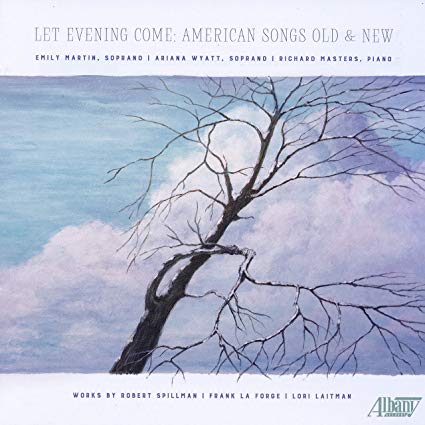
Released by Albany Records on February 1, 2020, this new compilation by sopranos Emily Martin, Ariana Wyatt and pianist Richard Masters includes works by Frank La Forge, Robert Spillman and Lori Laitman. Emily Martin and Richard Masters perform two of Hester Prynne's arias from The Scarlet Letter — "Beyond All Price" and "This Canopy of Trees."
To purchase the CD, please click here.
From Colin Clarke in Fanfare Magazine, Sept/Oct 2020 issue:
"Emily Martin lives each word, her soprano strong and pure. Richard Masters is a fine accompanist, and obviously an equally fine soloist as his performances of Frank La Forge’s Two Pieces proves...Lori Laitman has proved her talent for word setting a multitude of times. It is good, though, to see parts of her 2014 opera The Scarlet Letter here (the opera is available on Naxos: it was reviewed by James H. North in Fanfare 41:4 and subsequently made his Want List). On the Naxos recording, the part of Hester was sung by Laura Claycomb, where we get the wonderful tang of Laitman’s orchestration underpinning her soaring, lyrical voice in Hester’s Lullaby (“Beyond All Price”), which forms part of act I scene 2, “The Prison” (on the Naxos recording the lullaby begins almost exactly 10 minutes into the track that covers the entire scene). Hearing the opening dissonances on piano offers a more abstract approach, and the melting into the lullaby is arguably more effective. Ultimately, Claycomb on Naxos is the finer interpreter, her voice soaring with more abandon and less edge than Martin’s; yet to compensate there is more intimacy in the voice and piano version. Moving to the second scene of the second act, “The Forest,” and Hester’s aria “This Canopy of Trees,” here the protagonist’s sorrow is palpable, the light through the canopy reflecting the “light and shadow of our life.” Martin is touching, but the ear is often drawn to the excellence of Richard Masters’s contributions. If, in the final analysis, the premiere recording on Naxos offers the final ring of truth, it is wonderful to see this music excerpted so soon after its premiere. Laitman’s lyrical mode of utterance, her sense of color and her sensitivity to the words, are present in all their glory."
Memories of Hope
In April 2019, The Sorores Duo, comprised of soprano Amy Rosine and clarinetist Sandra Mosteller, released their CD Memories of Hope. Composers included include Jacob, Seiber, Vollenger, and a new recording of my song cycle I Never Saw Another Butterfly.
To purchase the CD, please click here.
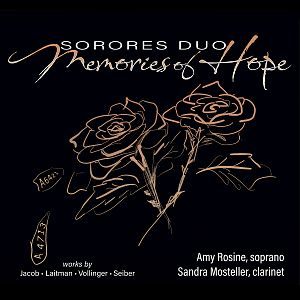
Gedankenverloren
Gedankenverloren was released on the Genuin label in March 2018, and includes soprano Katharina Konradi and clarinetist Andreas Lipp's recording of 3 of the 6 songs from Lori's I Never Saw Another Butterfly: The Butterfly; Yes, That's The Way Things Are and The Old House.
The CD was reviewed in the Nov/Dec 2018 issue of Fanfare Magazine: "Lori Laitman's songs are set to poems written by children held prisoner at the Teresienstadt concentration camp during World War II. The children were around 14 years old. These three are part of a cycle of six songs originally composed in 1996 for saxophone and voie, but later orchestrated for clarinet and voice...The opening clarinet is highly emotive. Our singer here is a perfect match for these elegant and simple songs. It also brings out just what a fine voice she has...Her English is excellent and clear. "Rotting in silence" is very powerfully sung."
To purchase the CD, please click here.

Notorious RBG in Song

Notorious RBG in Song was released by Cedille Records in June 2018, and features soprano Patrice Michaels and pianist Kuang-Hao Huang performing musical tributes to Supreme Court Justine Ruth Bader Ginsburg. Composers include Patrice Michaels, Vivian Fung, Derrick Wang, Stacey Garrop and myself. Included is my setting of Emily Dickinson's Wider Than The Sky, which was sung at Justice Ginsburg's 80th birthday celebration, and which "perfectly embodies her intellectual breadth."
"Laitman's Wider than the Sky," which was performed at RBG's 80th birthday celebration, sets a marvelous poem by Emily Dickinson. Both song and poem are gifts to savor for the long haul." Stereophile, June 24, 2018. To purchase the CD, please click here.
Remember

This new CD, produced by Glen Roven, was released in May 2018, and features all contemporary compositions by Benjamin Boyle, Jake Heggie, Jennifer Higdon, Glen Roven and myself. These are performed by these extraordinary artists: baritones Tobias Greenhalgh, Steven LaBrie and Jarrett Ott, and pianists Michael Brofman, Adam Nielsen, Glen Roven and Danny Zelibor.
My contribution is a new baritone version of my song cycle The Joy of Uncreating, written to poems by the late Joan Joffe Hall. Voix des Arts writes: "The interpretive symbiosis with which LaBrie and Nielsen ignite Boyle’s songs proves to be no less incendiary in their performance of Lori Laitman’s The Joy of Uncreating. Not unlike the textual integrity of her operatic setting of Hawthorne’s The Scarlet Letter, the composer’s uses of Joan Joffe Hall’s words in the songs on this disc are strikingly perceptive, her music dissecting the heart of the words with a tonal scalpel that pares away artifice. LaBrie and Nielsen cut into the flesh of ‘Illumination’ with unhesitant strokes, piercing the song’s torso with a gleaming blade sharpened on the backs of the words. Here and in ‘The Joy of Uncreating,’ they navigate the music’s paths through the texts with magnetic expressive dexterity."
The complete review can be found here. To purchase the CD, please click here.
The Eternal Feminine
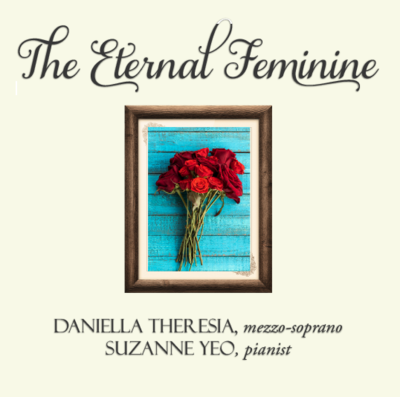
The Eternal Feminine, a CD by mezzo-soprano Daniella Theresia and pianist Suzanne Yeo, was released in 2018 and features several songs from Lori's cycle The Years (poetry by Sara Teasdale). For more information and to purchase, please click here
The Soul Fox
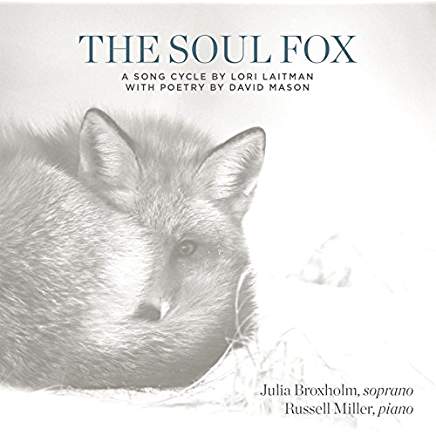 The Soul Fox, a cycle to poetry of David Mason, was commissioned by Reach Out Kansas, Inc. (ROKI) for soprano Julia Broxholm and pianist Russell Miller. Their premiere recording was released in March 2017 on Equilibrium Records. To purchase the CD, click here.
The Soul Fox, a cycle to poetry of David Mason, was commissioned by Reach Out Kansas, Inc. (ROKI) for soprano Julia Broxholm and pianist Russell Miller. Their premiere recording was released in March 2017 on Equilibrium Records. To purchase the CD, click here.
Portraits of Women
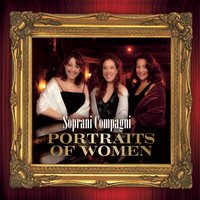 This new release by Soprani Compagni, features the premiere recording of Laitman’s Fresh Patterns for two soprano and piano, performed by Lisa Dawson, Tammie Huntington and Phoenix Park-Kim. To purchase this CD, click here.
This new release by Soprani Compagni, features the premiere recording of Laitman’s Fresh Patterns for two soprano and piano, performed by Lisa Dawson, Tammie Huntington and Phoenix Park-Kim. To purchase this CD, click here.
Gregory Berg reviewed the CD in the January/February 2020 Journal of Singing. About "Fresh Patterns," Laitman's settings of Emily Dickinson and Annie Finch, Berg writes: "The work opens with Laitman's exquisite setting of Emily Dickinson's "It's all I have to bring today," one of her finest and most famous poems. That is followed by "A Letter to Emily Dickinson," a text by contemporary poet Annie Finch in which she offers heartfelt thanks to Dickinson for her legacy. The work concludes with a stroke of genius as Laitman combines the first and second songs into a beautiful duet that seems to draw these two gifted poets from two different centuries into the same time and place. It is a work of extraordinary beauty and impact..."
Over The Fence: Songs of Elsa Resphigi, Lori Laitman and Modesta Bor
This new release on the Albany label features an intriguing mix of songs by women composers from various eras, brilliantly performed by soprano Tanya Kruse Ruck and pianist Elena Abend.
“ [This CD includes] a song cycle by Lori Laitman, one of the finest song composers before the public today…The first song, a setting of the famous words “Grow old along with me, the best is yet to be,” by Robert Browning, is vintage Laitman, with lush, warm lines that elevate this already beautiful poetry to even more powerful expressiveness. On the other hand, the saucy fun of “Over the Fence,” “They Might Not Need Me,” and “Wild Nights” is also vintage Laitman, thanks especially to her trademark mastery of playful rhythmic interplay and her fearless flair for flamboyant melodic gestures and climaxes.”(Journal of Singing)
Over the Fence: Songs of Elsa Respighi, Lori Laitman, and Modesta Bor
An Aids Quilt Songbook: Sing for Hope
An AIDS Quilt Songbook: Sing for Hope
“For star power alone, An AIDS Quilt Songbook: Sing for Hope merits a 10. But when you factor in the quality of the songs, and the fact that all profits go to amfAR, the organization now known as the Foundation for AIDS Research, you have a disc that deserves to be heard…There are two songs that feature more than one accompanist. Composer-pianist Lori Laitman joins Anthony McGill, principal clarinet of the New York Philharmonic, to accompany...Randall Scarlata in her beautiful setting of a poem by Emily Dickinson.” (Bay Area Reporter, 2015)
Opera America Songbook
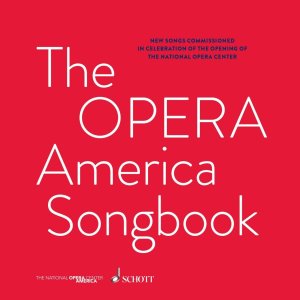
To purchase this 3 CD set, please click here
Laitman’s Building A House, to a poem by Minnesota Poet Laureate Joyce Sutphen, is one of the 47 songs commissioned by Opera America for the opening of the National Opera Center in NYC in September of 2012. Gregory Berg of The Journal of Singing recently reviewed the CD set and wrote: "Space does not permit comment on all forty-seven songs, but several deserve at least a brief mention. Lori Laitman's contribution to the collection is an exquisite setting of a text by Joyce Sutphen titled "Building a House," which Jennifer Check sings divinely."
Holocaust 1944
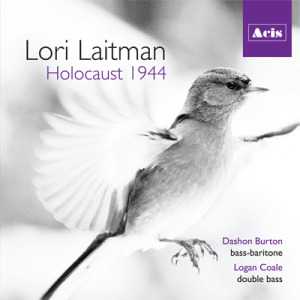
Grammy-award winning baritone Dashon Burton and bassist Logan Coale have recorded a new CD of my Holocaust 1944 song cycle. This was released on the Acis Productions label, with Geoffrey Silver as producer. For more information, including video and audio clips, please click here.
“Numerous composers have attempted to render the Holocaust (or at least some aspect of it) in music, often without the ends justifying their means. The present work, though, does not fall victim to its ambition: indeed, having already composed one such song-cycle – I Never Saw Another Butterfly (recorded by Hila Plitmann on Signum) – Lori Laitman was well placed to delve further into the wealth of poetry from Holocaust victims and survivors. The outcome is Holocaust 1944, seven songs in which the sombre restraint of the bass-baritone register is ideally complemented by its accompaniment for double bass. In spite (or perhaps because) of these restrictions, the sequence unfolds seamlessly and inevitability – with not a little wry humour to offset the prevailing mood of numbed tragedy. Dominant in expressive weight are the third and seventh settings: ‘Both Your Mothers’ sets a text by Jerzy Ficowski concerning the survival of life after another’s ‘death’, while ‘Holocaust 1944’ sets stanzas by Anne Ranasinghe in which recollection can only bring with it a sense of waste and futility. Projecting this music with the required intensity, while avoiding affectation, cannot be easy but Dashon Burton admirably conveys its understated eloquence, and in Logan Coale has a bassist of a dexterity matched by his feeling for melodic line; the whole recorded in a warmly sympathetic ambience. It would have been easy to extend the disc with further examples by this prolific song composer, though such a piece ideally needs to be heard on its own terms.” (Gramophone Magazine, February, 2015)
The Earth and I

This is the debut CD of The Washington Master Chorale, conducted by Thomas Colohan. It features world premiere recordings of works by Lori Laitman and Donald McCullough, both commissioned by the group. Other composers represented are Samuel Barber, Stephen Chatman, Norman Dinerstein, Cecil Effinger, Ross Lee Finney and Morten Lauridsen. Albany Records is releasing this CD in December 2013.
“The actual title of the disc comes from the result of Alba- ny’s first commission, Lori Laitman’s 2011 The Earth and I, based on poems by Emily Dickinson. The first movement, “The Sun Went Down,” uses warm, inviting harmonies and is beautifully sculpted by the Washington Master Chorale. Laitman matches Dickinson’s poignant text with an instinctive feel for the poem’s mood and shape, yet with harmonic language that is perfectly consistent. The second movement, “The Sky is Low,” is more complex texturally in its various strands and interactions, while the final set- ting, “The Wind,” references back to the first. There is some ecstatic writing (and singing) in this final movement. The Washington Master Chorale under the direction of Thomas Colohan responds sensitively to the various techniques employed by Laitman. ” (Fanfare Magazine, May/June2014)
To purchase this CD, please click here.
In My Memory: American Songs and Song Cycles
Centaur Records has released a new CD featuring tenor Kerry Jennings and pianist Amanda Asplund Hopson. This CD includes the premiere recording of Lori's "On A Photograph" (John Wood, poet) as well as a new rendition of "The Apple Orchard" (Dana Gioia, poet). Other composers represented are Libby Larsen, Richard Pearson Thomas and Tom Cipullo.
“Lori Laitman’s two songs possess a narrative quality reminiscent of Sondheim. The first, The Apple Orchard, uses “spring’s ephemeral cathedral” as a metaphor for a love the fails to seize the moment and thus is lost forever. Laitman composes long, melismatic vocal lines here over a resonant accompaniment. Her second setting is of an incredibly touching poem by John Wood imagining a homosexual love between two men in an old photo, taken “back when my grandparents were children.” The music has an autumnal quality with a direct gentleness characterizing the lovers, eventually depicting the loss of nearly everything about them except the photo. Jennings sustains the song’s mood with skill and judgment. ” (Arkiv Music, 2014)
“ There are two songs by the prolific composer of art songs, Lori Laitman. The Apple Orchard with text by Dana Gioia is a reminiscence, recalling that moment long past, of being in love but never lovers on an April day with blossoms open and he hesitatingly unsure. The second song, On A Photograph…, on a poem by John Wood, is a superb example of her art song writing skill. The poet looks at a photograph of two men and imagines their life together as a couple. Mundane events and their deep understanding of each other are captured convincingly in the flexibility of tempi matching the conversational tone of the poem. Ms. Laitman wrote to Mr. Jennings “…The tempo changes in On a Photograph are so important and so difficult, but you and Amanda nailed them. I am delighted.” This is the debut recording of On a Photograph I Found of Two Young Factories Workers Standing beside a Piece of Heavy Machinery Inscribed on the Reverse “Sacred to the Memory of Friendship.” ” (Artsong Update, 2014)
Natalie Mann: Experience
Soprano Natalie Mann and pianist Jeffrey Panko perform songs by Lori Laitman and Richard Pearson Thomas. This CD includes a complete recording of Lori's "The Metropolitan Tower and Other Songs" as well as her "Sunflowers" cycle and the premiere recording of her new Dickinson cycle "In This Short Life." Released by Albany Records in November 2013. To listen to excerpts, please click here. To purchase this CD, please click here.
“A stunning new release…The Metropolitan Tower belongs on any list of the finest art songs of the last thirty years…Laitman calls [Sunflowers] “one of my most complex song cycles,” …Surely that complexity sprang from the intriguing, multi-hued, nature-inspired texts of Pulitzer Prize-winning poet Mary Oliver, and Laitman responds with an exceptionally wide palette of colors and textures… There is a staggering amount of beauty and profundity in these sublime miniatures [In This Short Life] …Laitman has an unfailing ability to grasp the central essence of each of these poems and to express that essence in musical terms that seem fully authentic and perfectly true to Dickinson’s unique voice and vision. Art song composition does not get much better than this, and Mann and Panko are inspired to some of their most sensitive music-making tin the entire release.”(The Journal of Singing)
"A superb exponent of contemporary American songs, soprano Natalie Mann has a voice that is simultaneously strong and tender, passionate and subtle. Her phrasing is sensitive to the texts and unfailingly musical...Much of the album is given over to songs by the prolific Lori Laitman, a composer who is squarely in the American-romantic art song tradition of Barber and Rorem, though her harmonies are riper...Her style is lyrical, and she writes piano accompaniment that is transparent and appealing...A final reason to celebrate this album is the exquisite pianism of Jeffrey Panko..." (American Record Guide)
Marlissa Hudson: Lust
Marlissa Hudson's newest CD contains artsongs and arias that focus on the theme of sensuality. This CD includes a new recording of Lori's setting of Emily Dickinson's "Wild Nights." To order, please visit: http://marlissahudson.ironsage.com/discography/lust-album/
In This Moment: Women And Their Songs
Mezzo-soprano Katherine Eberle and Pianist Ksenia Nosikova present songs by Judith Cloud, Juliana Hall, Lori Laitman and Libby Larsen. Released by Albany Records in August 2013. Reviews soon. To purchase this CD on Amazon, please click here.
Andrew Garland: American Portraits
To purchase this CD on Amazon, please click here.
"Baritone and pianist both capture the right tone for Laitman's musically allusive, thoughtfully calibrated yet crowd-pleasing treatment of Lux's drolly observed quotidian pictures." (Opera News)
"Completing the collection is Lori Laitman’s entertaining Men with Small Heads, which springs upon the listener one delightful surprise after another. The earnest conversational tone of the first song and its sense of fun is a breath of fresh air, as is the mock melodrama and swirling contrasts of “Refrigerator 1957.” The third song, “A Small Tin Parrot Pin,” is one of those songs that constantly shifts, albeit it in subtle fashion, and to deliver it with such precise ensemble and clarity is incredibly impressive. Anyone who fears snakes may be tempted to avoid the fourth and final song, but to do so would be to miss out on one of the most intriguing songs on the disk. Make sure you listen to the last moment, to experience the snake’s frightening strike. Laitman seems incapable of composing anything but captivating art songs, and her utterly unique voice is a vivid presence here." (Journal of Singing)
Vocalise
Mezzo-soprano Wanda Brister and bassoonist Scott Pool have recorded Lori's "I Never Saw Another Butterfly" on this September 2013 CD released by Mark Records. To order, please click here.
The Ancient Question: A Voyage Through Jewish Songs
(Amazon, iTunes) Released in December 2011, this new CD features a new recording of Lori’s “I Never Saw Another Butterfly” with soprano Hila Plitmann and clarinetist Julian Bliss.
'The strongest musical offering is Lori Laitman's 1996 song cycle I Never Saw Another Butterfly, in which elegant, spare writing for voice and clarinet captures the poetic voices of children imprisoned in the concentration camp at Terezín. Clarinetist Julian Bliss partners Plitmann sensitively, especially in the intertwining duetting phrases of "Birdsong" and the melancholy drones of "The Old House." Plitmann turns quickly from the cheerful, ironic "Yes, That's the Way Things Are" to the harsh taunts of "Man Proposes, God Disposes."' (Opera News)
"Arguably the most memorable and moving music comes in the final song of Lori Laitman's cycle "I Never Saw Another Butterfly", in which clarinettist Julian Bliss proves a sensitive partner to the charismatic Plitmann." (BBC Music Magazine)
Wild Songs
Soprano Polly Butler Cornelius includes Lori's Four Emily Dickinson Songs on her Wild Songs recording (purchase).
“For people who think back nostalgically to Schubert and his musical circle and marvel at the small, private pleasures they enjoyed, here is evidence that such musical society and magic exist today, and that living composers such as Steve Heitzeg and Lori Laitman write music that is similarly attentive to the intimate, hidden beauties implicit in composing music for friends, as opposed to eternity…Laitman’s exquisite Four Dickinson Songs celebrates her own father’s 80th birthday…” (Gramophone Magazine)
Emerging Voices
Emerging Voices (purchase) features a new recording of Lori's "I Never Saw Another Butterfly" with soprano Elisabeth Halliday and saxophonist Zach Herchen.
Unsleeping: Songs by Living Composers
Unsleeping: Songs by Living Composers (Amazon), Patricia Green’s new CD, pays tribute to living composers from England, Canada, Hungary, Germany, Puerto Rico and the United States. The CD contains the premiere recording of the mezzo-soprano version of Lori’s Mystery and was released January 2009 on the Blue Griffin label.
“The teaming of composer Lori Laitman and poet Sara Teasdale in Mystery results in five songs of generous lyricism and propulsive ardor.” (Gramophone Magazine)
(In)habitation: Musical Settings Of Margaret Atwood
(In)habitation: Musical Settings Of Margaret Atwood (Amazon, Arkiv Music), performed by soprano Eileen Strempel and pianist Sylvie Beaudette, focuses on settings of Margaret Atwood poems by American women composers. It includes the premiere recording of Lori's Orange Afternoon Lover cycle.
"Lori Laitman's trilogy Orange Afternoon Lover is a delight from start to finish, although there is palpable pain in the first song, "Against Still Life."...The original poem is searing enough, but Laitman's music puts flesh on the bone in remarkable fashion. In stark contrast, "I Was Reading A Scientific Article" features the amorous outpouring of someone who is clearly more comfortable in the realm of scientific jargon, with what sounds like the bubbling of test tubes in the intricate accompaniment. The third poem, "I Am Sitting On The Edge," explores emotional fragility with discerning sensitivity, and Laitman's simple choice of repeating the poem's opening line at the end is a surprisingly strong statement in itself. It is not every composer who knows how to use a simple gesture to powerful effect, but Laitman is such a master composer." (The Journal of Singing)
"Lori Laitman chooses first-person narrative texts for the three songs of Orange Afternoon Lover. They are also among the longest and most complex of the Margaret Atwood poems that appear on this compilation. It is no surprise that the image of "crack your skull like a walnut, split it like a pumpkin" from Atwood's Against Still Life is rendered by Laitman in such a way that it retains incongruous shock value while avoiding derailment of the narrative. Likewise, her setting of the dubiously titled "I Was Reading a Scientific Article" is as buoyantly lyrical and whimsical as any of her many fine Dickinson songs. Although this self-described "accidental song composer" has been compared to Ned Rorem, Orange Afternoon Lover suggests she has much more in common with Samuel Barber by virtue of the sumptuous vocal lines and uncanny ability to craft Atwood's free verse prose so well that it sings like poetry." (Journal of the Society for American Music)
Songs of Life
Songs of Life (Amazon) includes the 3 songs from Lori’s “I Never Saw Another Butterfly” with soprano Eileen Mager and bassoonist John Friedeman. Released in 2008.
Songs in Transit: An American Expedition
Soprano Melanie Mitrano’s CD, Songs in Transit: An American Expedition (Capstone Records, Amazon, iTunes) includes the premiere recording of "Money" and a new recording of "The Hour,” with Lori at the piano. Released 2006 by Capstone Records.
Lori Laitman's setting of Dana Gioia's “Money” is one of her best. (New Music Connoisseur)
So Much Beauty
The Shining Place
Soprano Janeanne Houston has recorded 2 CDs with Lori’s songs: So Much Beauty (Amazon), which includes Lori’s “Two Dickinson Songs” (released in 2004); and The Shining Place (Amazon), which features 2 previously unreleased songs from The Metropolitan Tower cycle (released in 2006).
“Even more effective are the two songs by Lori Laitman, who sets two Sara Teasdale texts with the discerning sensitivity that we have come to expect from her. She has a truly exceptional gift for conveying the profoundest meaning of her texts, yet also taking care that the texts be perfectly understood.” (The Journal of Singing, in a review of The Shining Place)
Emily Dickinson in Song
Mezzo-soprano Virginia Dupuy includes two Laitman settings "If I..." and "They might not need me," on her CD Emily Dickinson in Song (Amazon). This CD was released June of 2004 on the Gasparo label.
She Says
Soprano Sonya Baker’s CD She Says, from 2004, features art songs of American women composers, and includes five of the six songs from Lori’s Days and Nights.
American Song Recital
American Song Recital (Amazon), released in 1993, was the first recording to include Lori’s works. With soprano Lauren Wagner and pianist Frederick Weldy, on the Channel Classics label.
“Lori Laitman was specifically asked by Lauren Wagner to compose a song. She chose a text by Sara Teasdale and the CD is worth owning for this song alone: magnificent!” (Phonogram Magazine, 1994)
Instrumental Music
Journey

This May 2016 release on Blue Griffin recordings features saxophonist Lau and pianist Kristin Ditlow in the premiere recording of Lori’s Journey.
To purchase this CD, please click here.
The Lyric Clarinet

Gerry Errante's CD, released on Ravello Records in February 2014, includes an arrangement, for clarinet and piano, of my song "The Apple Orchard”. To purchase this CD, please click here.
American Journey
Pianist Roger McVey’s CD, American Journey (cdbaby), was released in 2009, and features the premiere recording of Lori’s Nocturne, for solo piano.
If you have recorded Lori’s music and your CD is not appearing on this page, please contact Lori.






